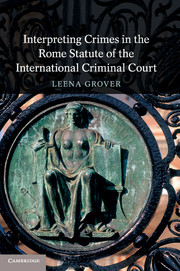Book contents
- Frontmatter
- Dedication
- Contents
- Foreword
- Acknowledgements
- 1 Introduction
- 2 The state of the art
- 3 Guiding interpretive principle
- 4 Challenges to the principle of legality
- 5 Operationalizing the principle of legality
- 6 Custom as an aid to interpretation
- 7 Internal indicia of codification
- 8 External indicia of codification
- 9 The Vienna Convention (1969) and aids to interpretation
- 10 Conclusions
- Bibliography
- Index
- References
2 - The state of the art
Published online by Cambridge University Press: 05 November 2014
- Frontmatter
- Dedication
- Contents
- Foreword
- Acknowledgements
- 1 Introduction
- 2 The state of the art
- 3 Guiding interpretive principle
- 4 Challenges to the principle of legality
- 5 Operationalizing the principle of legality
- 6 Custom as an aid to interpretation
- 7 Internal indicia of codification
- 8 External indicia of codification
- 9 The Vienna Convention (1969) and aids to interpretation
- 10 Conclusions
- Bibliography
- Index
- References
Summary
Introduction
The task of developing a legal methodology begins with a moment of hesitation. One cannot resist glancing across the vast horizon of international law in search of anything that might inform this effort. It must be recalled that judges of the International Criminal Court (Court) are not the first to interpret the definitions of international crimes. At the international level, the rules of interpretation in the Vienna Convention on the Law of Treaties (1969) (Vienna Convention) have been guiding judges’ interpretations for decades. And judges of the International Criminal Tribunals for the former Yugoslavia (ICTY) and Rwanda (ICTR) have been interpreting their governing statutes since 1994 and 1995 respectively. While the jurisdiction of both tribunals is limited territorially and temporally, their subject matter jurisdiction is similar to that of the Court. The ICTY’s jurisdiction extends to grave breaches of the Geneva Conventions on the Laws of War (1949) (Geneva Conventions), genocide, other crimes against humanity and violations of the laws or customs of war. The ICTR’s jurisdiction is limited to genocide, other crimes against humanity and violations of article 3 common to the Geneva Conventions (1949) and the second Additional Protocol (1977).
The Vienna Convention (1969) as well as ICTY and ICTR jurisprudence beg the question: has a methodology for interpreting international crimes already emerged organically in the case law of these tribunals? Have judges widely recognized certain principles or rules of interpretation governing international criminal law and arguments in support of them? If so, how can these developments assist one in building a methodology that is suitable for judges interpreting crimes in the Rome Statute of the International Criminal Court (Rome Statute or Statute)? And what roles, if any, have ICTY and ICTR judges assigned to various interpretive aids? As for the Rome regime proper, what idiosyncratic aspects of its Statute and Court will potentially influence interpretation by judges even while largely falling outside the purview of a methodology for performing this task?
- Type
- Chapter
- Information
- Publisher: Cambridge University PressPrint publication year: 2014



